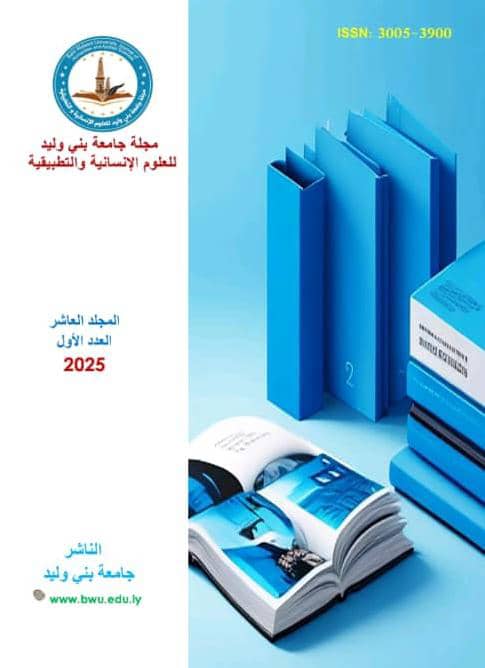The Role of Cultural Awareness in Successful EFL Communication
DOI:
https://doi.org/10.58916/jhas.v10i1.693الكلمات المفتاحية:
Cultural Awareness, EFL Communication، Intercultural Competence, Language Learning, Teaching Practices, Qualitative Research, Classroom Observations, Professionalالملخص
This study explores whether cultural awareness has a role in enhancing communication skills among EFL learners. The research explores how cultural knowledge influences intercultural competence and teaching practices and how a poor lack of cultural awareness affects learners. Semi-structured interviews, classroom observations, focus group discussions, and questionnaires collected data from 100 EFL students and teachers in Libya. Results showed an increased development of cultural awareness for these students, who consequently became communicative with great confidence while dealing with various people and improved understanding in dealing with different aspects of cultures embedded in languages. Some obstacles faced include the unavailability of resources, and a problem encountered was the student's reluctance to study topics concerning cultures. In other words, the study strongly recommended inculcating cultural awareness within the EFL curriculum, utilizing authentic materials, and creating space for teacher development. On these grounds, based on the research findings, recommendations were made about creating a culturally inclusive classroom by using interactive activities and assessing student cultural awareness. The findings call for the relevance of cultural awareness when teaching EFL to enhance a student's proficiency in effective communication in today's globalization.
التنزيلات
المراجع
Alptekin, C. (2002). Towards intercultural communication competence in ELT. ELT Journal, 56(1), 57-64. https://doi.org/10.1093/elt/56.1.57
Al-Quds Open University, Libya. (2025). About the University. Retrieved from https://www.qou.edu/en/index.jsp
Byram, M. (1997). Teaching and Assessing Intercultural Communicative Competence. Multilingual Matters.
Byram, M. (2008). From foreign language education to education for intercultural citizenship: Essays and reflections. Multilingual Matters.
Byram, M. (2022). Critical cultural awareness in language education. Intercultural Education, 33(1), 22-35. https://doi.org/10.1080/14675986.2022.2019756
Byram, M. (2022). The importance of critical cultural awareness in language education. Journal of Intercultural Studies, 43(3), 256-272. https://doi.org/10.1080/07256868.2022.2057834
Choudhury, P. (2022). Cultural awareness as a mediator of effective communication in EFL contexts. Language and Culture Research Journal, 14(1), 22-36. https://doi.org/10.1016/j.lcrj.2022.05.001
Corbett, J. (2021). Revisiting mediation: implications for intercultural language education. Language and Intercultural Communication, 21(1), 8-23.
Etikan, I., Musa, S. A., & Alkassim, R. S. (2016). Comparison of convenience sampling and purposive sampling. American Journal of Theoretical and Applied Statistics, 5(1), 1-4. https://doi.org/10.11648/j.ajtas.20160501.11
Farida, F., Supardi, S., Abduh, A., Muchtar, J., Rosmaladewi, R., & Arham, M. (2024). Technology and hybrid multimedia for language learning and cross-cultural communication in higher education. ASEAN Journal of Science and Engineering, 4(2), 331–348. https://doi.org/10.17509/ajse.v4i2.72609
Garcia, S. (2020). The role of cultural awareness in enhancing communication. Journal of Language and Intercultural Communication, 20(3), 300-315. https://doi.org/10.1080/14708477.2020.1711341
Gudykunst, W. B., & Kim, Y. Y. (2003). Communicating with Strangers: An Approach to Intercultural Communication (4th ed.). McGraw-Hill.
Hall, E. T. (1976). Beyond Culture. Anchor Books.
Hofstede, G. (1984). Culture's Consequences: International Differences in Work-Related Values. Sage Publications.
Huang, L. (2021). Cultural awareness and its role in foreign language learning: A study of EFL learners in China. Language and Intercultural Communication, 21(2), 148-161. https://doi.org/10.1080/14708477.2020.1806762
Jenkins, J. (2015). English as a Lingua Franca: Attitude and Identity. Oxford University Press.
Jiang, W. (2000). The cultural dimension of language teaching: A critical review of some recent perspectives. International Journal of Intercultural Relations, 24(3), 379-394. https://doi.org/10.1016/S0147-1767(00)00013-9
Kramsch, C. (1993). Context and Culture in Language Teaching. Oxford University Press.
Leung, A. K. Y., Ang, S., & Tan, M. L. (2014). Intercultural competence. In J. C. Chrisman & P. E. Leonard (Eds.), The Cambridge handbook of social theory (pp. 461-479). Cambridge University Press.
Li, J., & Zhang, W. (2022). Addressing pragmatic failures in EFL learners through cultural awareness training. TESOL Quarterly, 56(2), 345-361. https://doi.org/10.1002/tesq.1234
Liddicoat, A. J., & Scarino, A. (2013). Intercultural language teaching and learning. Wiley-Blackwell.
Liu, X., & Fang, Y. (2024). A systematic review of cross-cultural communicative competence in undergraduate English instruction. Humanities and Social Sciences Communications, 11(1), 1-10.
DOI: 10.1057/s41599-024-04071-5
Nilsson, M. (2018). Literature as a tool for teaching cultural awareness in the EFL classroom. Göteborgs Universitet. Retrieved from https://gupea.ub.gu.se
Oberste-Berghaus, N. (2024). The Role of Teaching Foreign Languages in Developing Intercultural Competence. Revista Romaneasca pentru Educatie Multidimensionala, 16(1), 01-15.
Rosenblatt, D., & Lee, S. (2020). Cultural competence in foreign language education: The case of Chinese as a foreign language. Language Teaching Research, 24(5), 625-644. https://doi.org/10.1177/1362168820920780
Schieble, M., Vetter, A., & Martin, K. M. (2020). Classroom talk for social change: Critical conversations in English language arts. Teachers College Press.
Smith, J. A. (2022). Challenges in integrating cultural awareness in EFL instruction: A teacher's perspective. Journal of Language Teaching and Research, 13(4), 789-798.
DOI: 10.17507/jltr.1304.12
Spitzberg, B. H., & Changnon, G. (2009). Conceptualizing intercultural competence. In B. H. Spitzberg & G. Changnon (Eds.), The Handbook of Intercultural Competence (pp. 2-52). SAGE Publications.
Tennakoon, O. (2024). The Impact of Cultural Background on English Language Politeness Strategies for Ukrainian Adult Learners in Norway (Master's thesis, Inland Norway University).
Thomas, J. (1983). Cross-Cultural Pragmatic Failure. Applied Linguistics, 4(2), 91-112. https://doi.org/10.1093/applin/4.2.91
Tuncer, G. (2020). Developing cultural competence in language learners: Insights from global education. Journal of Language and Cultural Education, 8(3), 76-89. https://doi.org/10.2478/jolace-2020-0007
University of Tripoli, Libya. (2025). About Us. Retrieved from http://www.uot.edu.ly/en/
Vygotsky, L. S. (1978). Mind in Society: The Development of Higher Psychological Processes. Harvard University Press.
Wang, H., & Chen, L. (2022). The impact of intercultural training on EFL teachers’ ability to foster cultural awareness. International Journal of Language Studies, 16(4), 45-63. https://doi.org/10.1080/14664208.2022.2130945
Wang, Y., & He, Q. (2019). Understanding and integrating cultural awareness in EFL contexts: A critical approach. Language Education in Asia, 10(2), 139-157. https://doi.org/10.22237/leia/1571893142
Yurtsever, A., & Özel, D. (2021). The role of cultural awareness in the EFL classroom. Turkish Online Journal of Qualitative Inquiry, 12(1), 102–132. https://doi.org/10.17569/tojqi.776499
Zhang, L., & Chen, H. (2023). Enhancing EFL learners' native cultural awareness via project-based learning. English Language Teaching, 16(2), 45-58.
DOI: 10.5539/elt.v16n2p45
Zhang, X. (2021). Cultural integration in foreign language education: Challenges and solutions. International Journal of Applied Linguistics, 31(4), 462-476. https://doi.org/10.1111/ijal.12357













